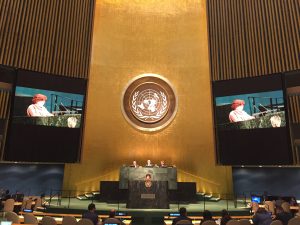As delivered
Statement by H.E. Mr Peter Thomson, President of the 71st Session of the General Assembly, at Commemorative Plenary Meeting of the General Assembly to Observe International Day for the Elimination of Racial Discrimination – “Racial profiling and incitement to hatred, including in the context of migration”
21 March 2017
Ms. Louise Arbour, Special Representative of the Secretary-General for International Migration
Ms. Anastacia Crickley, Chair of the Committee on the Elimination of Racial Discrimination
Mr. Mutuma Ruteere, Special Rapporteur on contemporary forms of racism, racial discrimination, xenophobia and related intolerance
Excellencies,
Distinguished delegates,
We meet today – the 21st of March – to observe, for the fiftieth time, the International Day for the Elimination of Racial Discrimination.
It is an occasion for us all to reflect on the mistakes of our past, and to renew our determination to not let them be repeated.
When the General Assembly first proclaimed the 21st of March as International Day for the Elimination of Racial Discrimination, it was under the determined leadership of South Africa to never let the injustices of apartheid be forgotten.
This date was selected to memorialize the 69-unarmed people killed by police during a peaceful demonstration against apartheid-era policies in Sharpeville, South Africa.
On this occasion, on behalf of the General Assembly, I commend South Africa for its global leadership in the fight against racism. In particular, I thank Her Excellency Ms. Susan Shabangu, Minister in the South African Presidency Responsible for Women, and His Excellency, Guillaume Long, Minister of Foreign Affairs and Human Mobility of Ecuador, who will be addressing the General Assembly later today.
Excellencies,
As we look around our world, it is challenging to us all to see just how far we are from winning the global fight against racism, xenophobia and related intolerance.
Despite global migration long being a feature of human history, and despite the exigencies of forcible displacement having driven large numbers of people from their homes, refugees and migrants are too often being received these days in conditions of suspicion, fear and intolerance.
At a time when the world needs to call on its reserves of empathy and common humanity as we respond to the largest humanitarian and refugee crisis since World War II, we are instead too often witnessing hate crimes against immigrant asylum seekers, attacks against places of worship, and threats directly targeting migrants and minority groups.
In such circumstances we must reaffirm our faith in the International Convention on the Elimination of All Forms of Racial Discrimination, more than 50 years after its adoption by the General Assembly, along with our commitment to the Durban Declaration and Programme of Action.
Excellencies,
In these challenging times, the Universal Declaration of Human Rights calls on us to stand up against racism, xenophobia and hate wherever we encounter them. And people of conscience should stand up for pluralism and cross-cultural understanding, whenever the opportunity allows.
Across the globe, it is incumbent upon political leaders to role-model tolerant and respectful attitudes towards migrants.
We need to promote cross-cultural education in our schools, to foster respect for diversity. and understanding of the positive contribution refugees and migrants make to our societies and economies.
Most critically of all, we need to fully support implementation of the 2030 Agenda for Sustainable Development to secure a safer, more sustainable and prosperous future for all, one which will relieve many of the root causes driving people from their homes.
This includes by eliminating extreme poverty, building peaceful and inclusive societies, increasing prosperity, reducing inequality, improving access to education, combating climate change, and protecting our natural environment.
Finally, we must use the historic opportunity of the forthcoming negotiations on a Global Compact for Safe, Orderly and Regular Migration to affirm universal respect for the rights of migrants.
Excellencies,
I conclude with a quotation from South Africa’s most famous son, Nelson Mandela, who once said “No one is born hating another person because of the colour of his skin, or his background, or his religion. People must learn to hate, and if they can learn to hate, they can be taught to love, for love comes more naturally to the human heart than its opposite.”
I thank you


